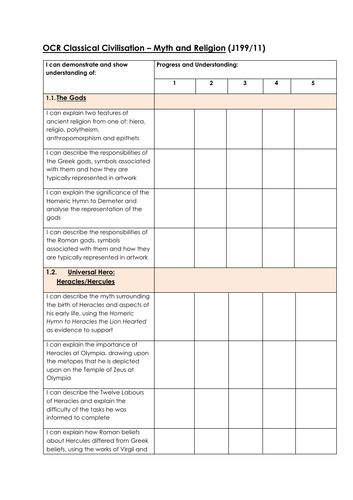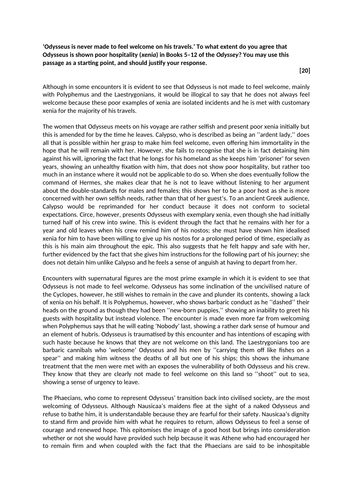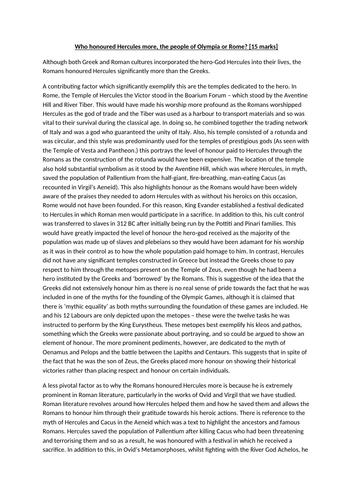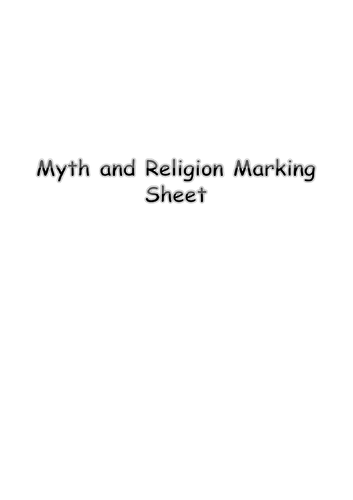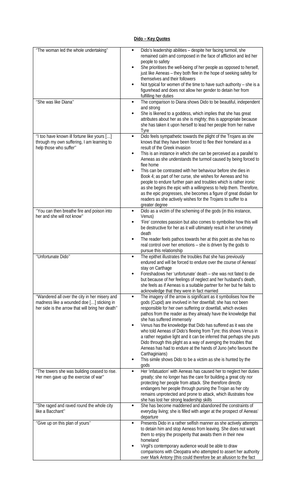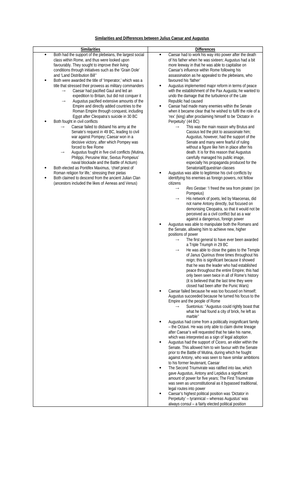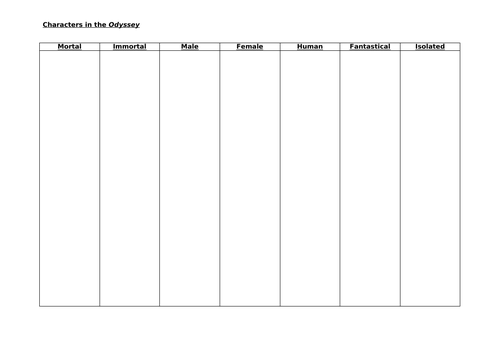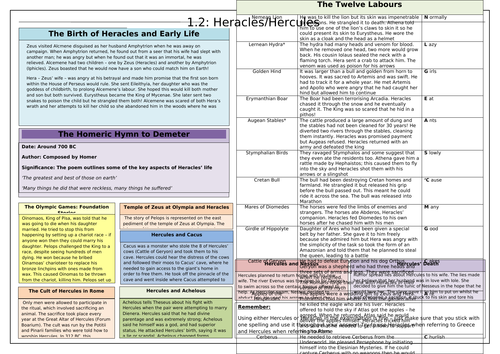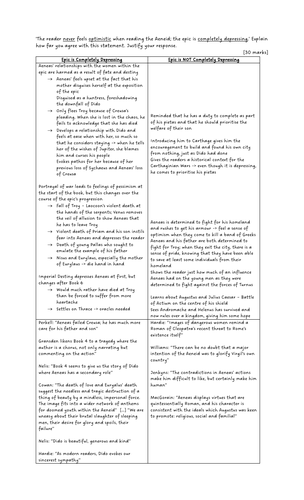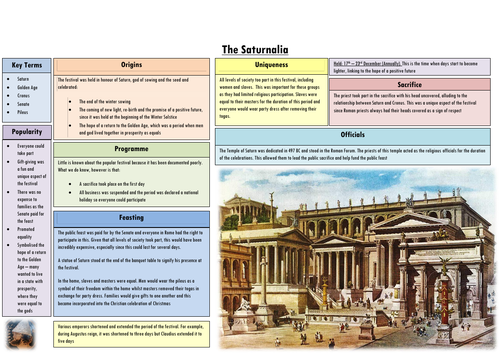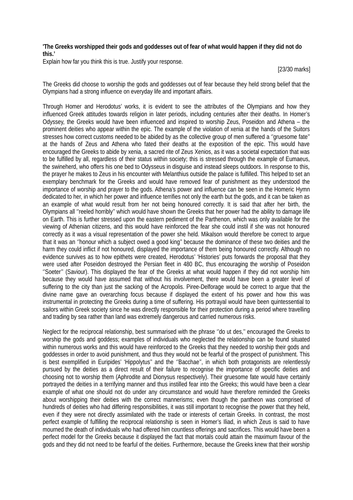
200Uploads
81k+Views
47k+Downloads
Classics
Sale

Odysseus is able to defeat the Suitors only thanks to deceit and trickery
The following essay was written in response to the question:‘’Odysseus is able to defeat the Suitors only thanks to deceit and trickery’’. It can be used as an example essay after mocks or as a source of revision for students. It is intended to be used by GCSE students studying ‘‘Homeric World’’ (OCR Classical Civilisation specification)
Sale

Myth and Religion: Revision Checklist
Revision checklist for OCR GCSE Classical Civilisation: ‘Myth and Religion,’ covering all eight topics studied as part of the course and covering the contents found within the specification.
Sale

‘Odysseus is never made to feel welcome on his travels.’
The following answer scored 18 out of 20 marks and is focused on the concept of xenia throughout Odysseus’ travels in Homer’s Odyssey. It can be used as an example essay after mocks or as a source of revision for students hoping to attain higher grades, intended to be used by AS/A-Level students studying the OCR Classical Civilisation ‘World of the Hero’ specification.
Sale

Homer's Odyssey: Quote Collection
A document containing a selection of quotes, broken down into their relevant themes and characters, designed for AS/A-Level students studying the ‘World of the Hero’ as part of OCR’s A-Level specification.
Themes included: The Concept, Value and Behaviour of a Hero, Disguise, Deceit and Trickery, Recognition, Revenge and Justice, Role of the Immortals, Relationship between Mortals and Immortals, Xenia, Nostos, Fate, Men, Women, Children and the Family, Role of the Slave, Role of Women, Portrayal of Different Societies
Characters included: Odysseus, Telemachus, Suitors, Odysseus’ Crew, Phaecians, Penelope, Calypso, Polyphemus, Circe, Laertes, Slaves and Minor Characters
Sale

The skill it took to build Mycenaean tombs should be admired more than the contents inside
The following essay was writing in response to the statement:The skill it took to build Mycenaean tombs should be admired more than the contents inside. It was written as part of a mock examination for the GCSE OCR specification for Mycenae (Literature and Culture) and achieved the full fifteen marks.
It can be used as a source of revision to help exemplify how to answer longer essay-based questions or used when responding to feedback.
Sale

OCR Classical Civilisation Homeric World (Mycenae, Literature and Culture) Checklist
Revision checklist for OCR GCSE Classical Civilisation: ‘Mycenae’ covering all four topics studied as part of Paper 2.
Sale

Who honoured Hercules more - the Greeks or the Romans?
The following essay was writing in response to the question: ‘Who honoured Hercules more, the people of Olympia or Rome.’ It was written as part of a mock examination for the GCSE OCR specification for Myth and Religion and achieved the full fifteen marks.
It can be used as a source of revision to help exemplify how to answer longer essay-based questions or used when responding to feedback.
Sale

Myth and Religion (OCR GCSE Classical Civilisations) Marking Sheet/Grid
A simple one page document with the assessment criteria for the OCR GCSE Classical Civilisation specification.
The mark-scheme for all relevant essay questions is broken down into squares with the relevant marks that can be highlighted/circled and for stimulus and extended response questions, there is additional space for any further comments/skills to work on as well as well as a space for personal improvements in addition to teacher comments.
Can be completed digitally and then stuck in during responding to feedback or by hand.
Ideal for responding to feedback.
Sale

Dido: Quote Sheet
A selection of quotes for Virgil’s Aeneid, focusing on Dido. The quotes are supported with interpretations of Dido’s character - designed for AS/A-Level students studying the OCR specification for ‘World of the Hero’
Sale

Similarities and Differences between Julius Caesar and Augustus
A comparative list of differences between Julius Caesar and Augustus (Octavian). Useful for when studying the OCR Specification for ‘Imperial Image’ (Topic 1 - Octavian Comes to Rome).
Sale

Imperial Image Folder Dividers
Folder dividers broken down into each of the five topic areas for OCR’s AS/A-Level specification for ‘Imperial Image.’ It is broken down into the relevant themes, with a list of both prescribed and additional sources.
Sale

Characters in Homer's Odyssey
This resource contains a list of characters found within Homer’s Odyssey and an accompanying table which breaks down the different categories of characters (i.e. Mortals, Immortals, Loyal Servants, Disloyal Servants) and is intended for use of AS/A Level Students but can equally be used by GCSE students. It is best to be completed prior to reading to help gage an understanding of the individuals involved within the storyline of the epic and can be constantly referred back to to help understand how several characters overlap in multiple categories.
Sale

‘Admirable but unlikeable.’ Explain whether Dido deserves this description
The following mid-response answer is focused on the extent to which Dido can be percieved as admirable but unlikeable. It can be used as an example essay after mocks or as a source of revision for students , intended to be used by AS/A-Level students studying the OCR Classical Civilisation ‘World of the Hero’ specification.
Sale

Dido Critical Perspectives: Virgil's Aeneid
Critical perspectives about Dido, designed for OCR’s A-Level Classical Civilisations specification for ‘‘World of the Hero’’ to help aid analysis.
Sale

Heracles/Hercules Knowledge Organiser - GCSE Classical Civilisations
This knowledge organiser has been designed for students studying OCR’s GCSE Specification for Myth and Religion and covers 1.2 ‘Heracles/Hercules.’ It provides an overview of:
Birth and Early Life
The Twelve Labours
The Foundation of the Olympic Games
Hercules and Cacus
Hercules and Achelous
Hercules and Nessus
Hercules’ Cult in Rome
Hercules’ Death
Sale

‘The reader never feels optimistic when reading the Aeneid; the epic is completely depressing.’
‘The reader never feels optimistic when reading the Aeneid; the epic is completely depressing.’’ It can be used as an example essay after mocks or as a source of revision for students. It is intended to be used by AS/A-Level students studying the OCR Classical Civilisation ‘World of the Hero’ specification.
*Also includes essay plan, comparing evidence that is optimistic and depressing, in addition to relevant scholarship
Sale

Homer's Iliad Scholarship Booklet (OCR A-Level Classical Civilisations)
The following document contains an array of scholarly views in relation to Homer’s Iliad and has been designed for students studying the OCR Classical Civilisations Specification for ‘World of the Hero.’
This can be easily adapted so that you can add or remove relevant pieces of scholarship. There is space for annotations (i.e. you may wish to include examples from the text to support the scholars viewpoint or link this to opposing arguments)
Sale

Festivals Knowledge Organisers - GCSE Classical Civilisations
These knowledge organisers has been designed for students studying OCR’s GCSE Specification for Myth and Religion and covers 1.5 ‘Festivals.’ There is one knowledge organiser/revision placemats for all four prescribed festivals:
The Panathenia
The City Dionysia
The Lupercalia
The Saturnalia
Sale

Religion and the City, Temples: Knowledge Organiser - GCSE Classical Civilisations
This knowledge organiser has been designed for students studying OCR’s GCSE Specification for Myth and Religion and covers 1.3 'Religion and the City: Temples.’ It provides an overview of:
The importance of the sanctuary
Sacrifices
Greek Priests
Roman Priests (Pontifices, Augurs and the Vestal Virgins)
Temple Buildings (Greek and Roman)
Parthenon
Temple of Zeus at Olympia
Temple of Portunus
The Pantheon
Sale

'The Greeks worshipped their gods and goddesses out of fear of what would happen if they did not do
The following answers scored 23 out of 30 marks and is focused on Greek worship. It can be used as an example essay after mocks or as a source of revision for students. Intended to be used by A-Level students studying the OCR Classical Civilisation ‘Greek Religion’ specification.


